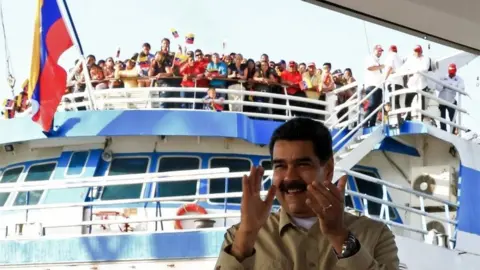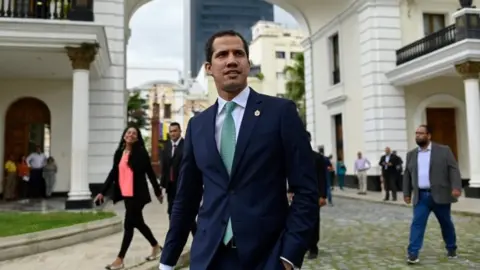US imposes sweeping sanctions on Venezuelan government
 AFP
AFPPresident Donald Trump has imposed sweeping sanctions on the Venezuelan government, freezing its assets in the US and barring transactions with it.
This measure is expected to be far more damaging for Venezuela's socialist government than previous sanctions.
The move is the latest aimed at increasing pressure on President Nicolás Maduro to step down.
The US is one of more than 50 nations that do not recognise Mr Maduro as Venezuela's legitimate president.
It has instead given its backing to the head of the National Assembly, Juan Guaidó, who declared himself president in January.
What is the new measure?
President Trump signed an executive order which states that "all property and interests in property of the government of Venezuela that are in the United States... are blocked and may not be transferred, paid, exported, withdrawn, or otherwise dealt in".
The order also bars transactions with Venezuelan authorities whose assets are blocked, stating that "the making of any contribution or provision of funds, goods, or services by, to, or for the benefit of any person whose property and interests in property are blocked pursuant to this order".
"The receipt of any contribution or provision of funds, goods, or services from any such person," is also banned.
What does it mean?
The move really ramps up the pressure on President Maduro by not only targeting his government's assets in the US but also the individuals, companies and countries doing business with his government.
It means that Venezuela will face many of the US restrictions on Cuba, Iran, North Korea and Syria.
It goes much further than previous US sanctions which targeted Venezuelan leaders, including President Maduro himself, and specific state-run entities such as oil company PDVSA, Venezuela's central bank and its development bank.
US National Security Advisor John Bolton said the new sanctions could be imposed on "anyone who supports" Mr Maduro's government.
The new measures, he added, would force countries and companies to choose between doing business with the US or with Venezuela.
America would use "every tool to end Maduro dictatorship in Venezuela", he said.
What's the aim?
In a letter to the US Congress, President Trump wrote that he had imposed the measure "in light of the continued usurpation of power by Nicolás Maduro and persons affiliated with him, as well as human rights abuses, arbitrary arrest and detention of Venezuelan citizens".
The aim is to further isolate the Venezuelan government and attempt to cut it off from the support it has been getting from its most powerful allies, China and Russia.
As previous sanctions have not succeeded in removing President Maduro from power, President Trump is tightening the screws in an attempt to speed up his removal from power.
The US government has said exemptions will include the provision of humanitarian goods, food and medicine.
Venezuela has long blamed US sanctions for the dire state of its economy.
Why now?
More than six months have passed since Juan Guaidó declared himself interim president, arguing that Mr Maduro's re-election last year was fraudulent.
 AFP
AFPMr Guaidó has since managed to secure the backing of more than 50 nations, but failed to remove Mr Maduro from power.
Meanwhile, Venezuelans continue to flee the political and economic crisis in huge numbers. More than four million are now living abroad according to UN figures.
International pressure to solve the Venezuelan crisis is mounting with more than 50 countries currently meeting in the Peruvian capital, Lima, to discuss a solution.
What's the reaction been?
Mr Guaidó has welcomed the new measure arguing that it punishes those "who do business with the regime". He argues that the freeze seeks to "protect Venezuelans" by punishing those "who uphold the usurpation, benefitting from the hunger and the pain of Venezuelans".
Venezuela's foreign ministry denounced the fresh sanctions calling them "another serious aggression by the Trump administration through arbitrary economic terrorism against the Venezuelan people".
